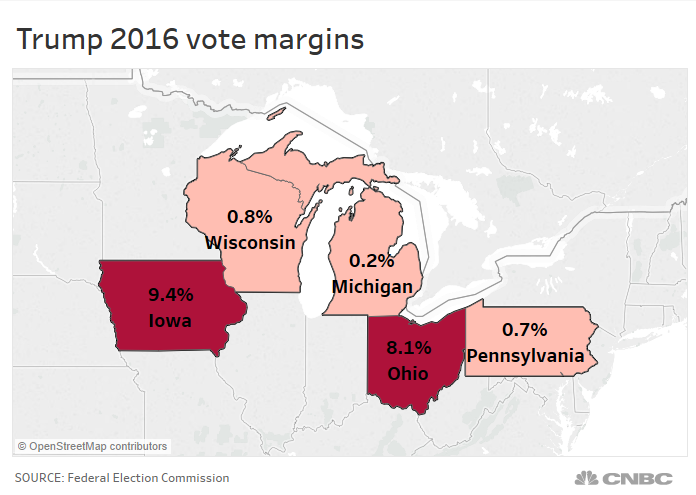Trump's trade war polls badly in key states like Pennsylvania, threatening his support for 2020 - 4 minutes read
U.S. President Donald Trump walks toward journalists as he departs the White House for a campaign rally in Pennsylvania May 20, 2019 in Washington, DC.
Chip Somodevilla | Getty Images
American voters may be happy with the red-hot economy, but they're not thrilled about President Donald Trump or his trade agenda overall.
That's according to a Quinnipiac University national poll released Tuesday of 1,078 voters surveyed between May 16 and May 20, which found that just 39% approve of the president's handling of trade, while 53% disapprove. The poll carries a margin of error of plus or minus 3.7%.
Trump's approval on trade reportedly doesn't fare much better in key industrial states — which had carried him to victory in 2016 and are crucial for his 2020 reelection bid, but whose farmers have been hit hardest by the ongoing trade war.
.1558534436608.png)
Voters' disapproval on trade contrasts starkly with their views of the economy as a whole. A large majority of respondents, 71%, said that the economy is in either "excellent" or "good" standing — a figure Quinnipiac says is the highest total for those categories in nearly 18 years.
But the high marks for the economy don't appear to be lifting Trump's approval ratings. The president had 38% approval in the Quinnipiac poll, and 57% disapproval. That's a wider gap in approval than Trump scored in the last Quinnipiac survey in early May.
Voters are increasingly unimpressed with Trump's handling of trade, as well as on China, the main adversary in his trade war.
Opinion on Trump's trade policies has soured since January, the last time the pollster asked voters, "Do you approve or disapprove of the way Donald Trump is handling trade?"
What's worse, 48% of respondents in the most recent poll say that Trump's protectionist trade policies are bad for the U.S. economy, versus 40% who say they are helping. And more voters — 44% to 36% — also say that Trump's trade policies are bad for their personal financial situations.
Trump's marks aren't much better on China: 50% of voters disapprove of his job handling U.S. policy toward that economic superpower, compared with 40% who approve of the president's approach.
The U.S. and China are locked in a protracted trade dispute, and both sides have ratcheted up the aggression in recent weeks.
In May, Trump announced an increase in tariffs to 25% on $200 billion of Chinese goods, sending markets into a tizzy and prompting China to retaliate by raising duties on $60 billion in American products. Shortly after, the trade talks with China appeared to hit a roadblock, with no clear schedule in place to continue negotiations after the U.S. said China reneged on past promises and Beijing took steps to prop up its currency.
Key states for Trump, key states on trade
Quinnipiac sent additional data to The Washington Post on how voters felt about Trump's trade and China policies in five industrial states: Pennsylvania, Michigan, Wisconsin, Ohio and Iowa.
Trump won all of those states in the 2016 contest against his Democratic rival, former Secretary of State Hillary Clinton. But more voters in those five states disapprove than approve of Trump's handling of trade — 56% to 41%, according to the Post.

The report also says that just 39% of those voters approve of Trump's handling of China, versus 53% who don't. And only 39% say Trump's trade policies are good for the U.S. economy, versus 47% who say they're bad.
Trump, who described himself as a "tariff man" as president, has long maintained that taxes on imports will strengthen the U.S. and has promised that trade wars are "easy to win." But China has targeted its retaliatory tariffs for maximum impact, and economists say they are hitting U.S. farmers at "every single angle." Beijing's continued actions could threaten to undermine support from constituencies that are more likely to support Trump and Republicans in upcoming elections.
The White House did not immediately respond to CNBC's request for comment on the poll.